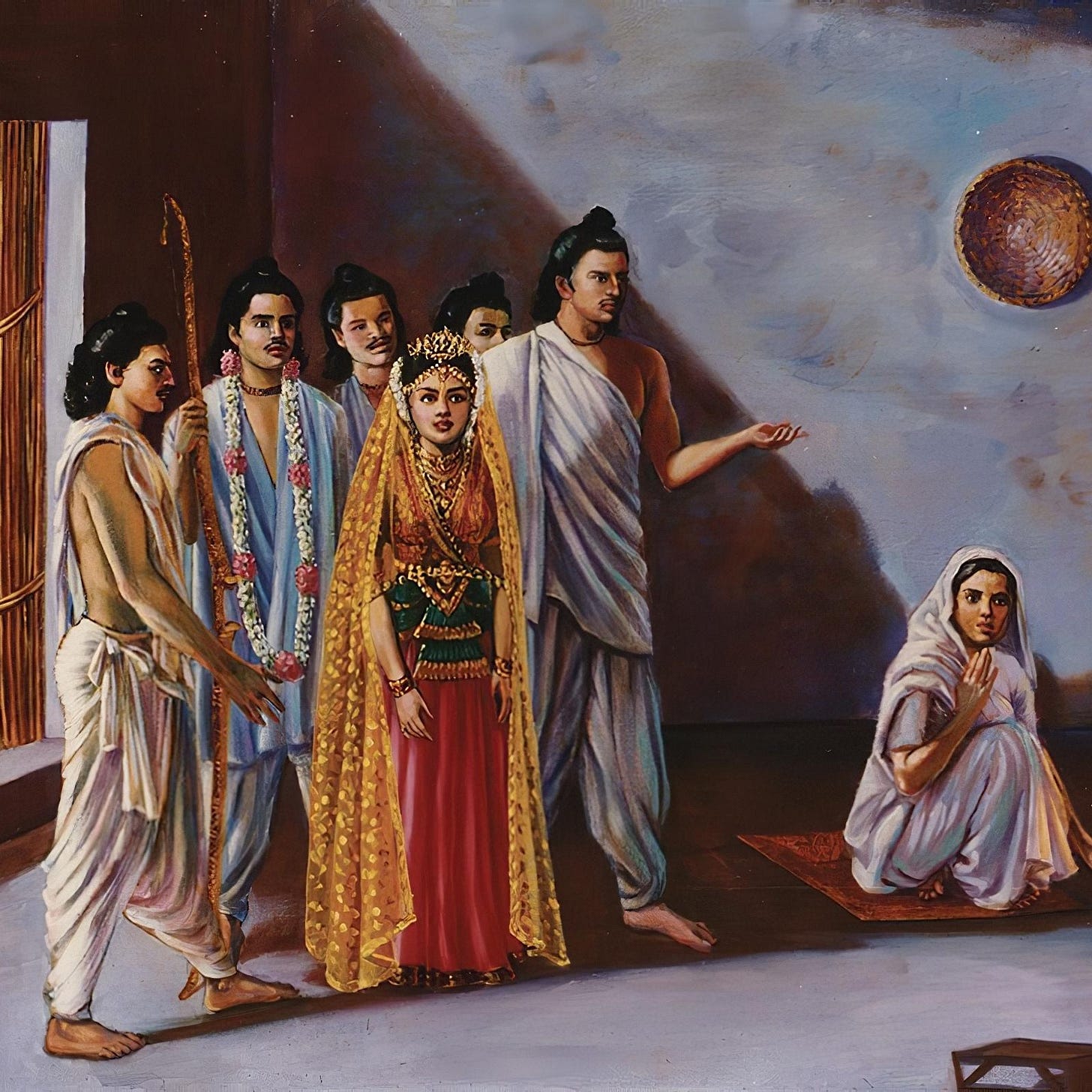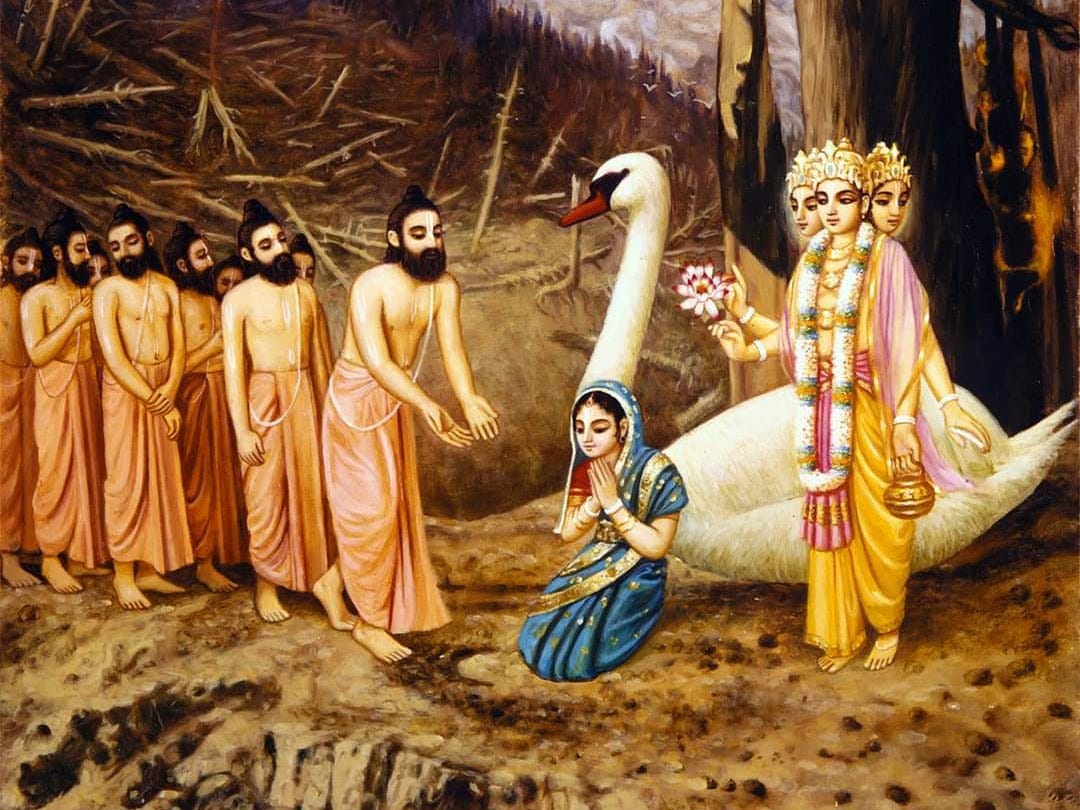Polygamy, polyandry, and the Vedas
The Vedas mention many cases of polygamy. Another practice that is also described, although less common is polyandry, like in the case of Draupadi, and Pramloca. Should we also do it? Not so fast...
It's well known that the Vedas mention cases of polygamy. It's mentioned that this practice was common in previous ages since many men would remain as lifelong celibates, as brahmacaris and later sannyasis, and thus not enter into family life, just like many others would die in wars. In this way, the female population in Vedic societies would be almost always greater than the male population available for marriage, and the problem would be solved by some men marrying more than one woman. It’s different from how it’s done in most societies nowadays, but it should be respected, especially considering how it worked for thousands of years.
Another practice that is also described, although less common is polyandry, or one woman marrying more than one husband, like in the case of Draupadi marrying the five Pandavas, or Marisa, the daughter of Kandu and Pramloca, who married the ten Pracetas.
According to Srila Prabhupada in his purport to ŚB 4.30.16, in previous ages sometimes a woman would marry a man together with his brothers, as in the case of both Draupadi and Marisa. This practice is still practiced in villages of Tibet, usually with the purpose of avoiding dividing the land possessed by the family.
“In special instances, however, it is found that a woman has more than one husband. Draupadī, for instance, was married to all of the five Pāṇḍava brothers. Similarly, the Supreme Personality of Godhead ordered all the sons of Prācīnabarhiṣat to marry the one girl born of the great sage Kaṇḍu and Pramlocā. In special cases, a girl is allowed to marry more than one man, provided she is able to treat her husbands equally. This is not possible for an ordinary woman. Only one who is especially qualified can be allowed to marry more than one husband.” (ŚB 4.30.16)
Since polygamy and polyandry are mentioned in the Vedas, should we also start practicing it? Not so fast...
Actually, both polygamy and polyandry are largely practiced in modern societies, including inside our spiritual society, in the form of divorces and remarriages, which are nothing more than forms of serial polygamy and polyandry. A man has several wives, and a woman has several husbands, although not at the same time. This is however not sanctioned in the scriptures.
Another point is that although practiced in previous ages, polyandry is forbidden in Kali-Yuga. The injunction from the scriptures is kalau pañca vivarjayet: In this age, a woman is forbidden to marry her husband’s brother. Even in previous ages, cases like Draupadi and Marisa were exceptions and not the rule. Such marriages would be allowed only in special circumstances, in the case of extraordinarily qualified ladies who would be able to treat all their husbands equally.
What about polygamy? Although generally allowed in the scriptures, polygamy is not considered the best standard. Vedic culture values spiritual progression and detachment, and polygamy is not an efficient way to achieve eighter.
For a man to accept more than one wife he has to be able to acquire a lot of material facilities to provide separate houses, servants, and ornaments for each wife, as well as to provide for all of their children. Ksatriyas and successful Vaisyas could do that, but other men would be seriously pressed to fulfill all these obligations. In our day and age that's especially ludicrous, since most men can't even properly maintain even one wife.
We can also see that, although allowed, polygamy was the source of many problems, even in previous ages. The whole pastime of Dhruva Maharaja started with a King who had two wives. One wife was envious of the other and wanted to make her son the next king, instead of the older son of the first wife. The king fell under the control of the second wife and thus neglected his older son. Another example is the story of Yayati, who ended up being cursed when Devayani became angry at him becoming more attracted to Sharmistha.
People in previous ages were much more qualified and self-controlled than now. We could just imagine what kind of problems we would have if these practices became widespread in our current society. Although Prabhupada mentions the practice of polygamy in his books, mentioning it as common in bygone ages as part of the Vedic culture, his final decision was that it should not be practiced in our spirtual society, since our purpose is to become detached from this world, and not to increase our attachment. Srila Prabhupada also acknowledged the potential problems associated with it.
We can see that although polygamy is mentioned in the sastras, the highest example is given by Lord Rama, who had only one wife. Polygamy was offered as a concession for men who were too lusty, as well as a way to solve the problem of lack of marriable men in previous ages. Nowadays men who can adequately take care of more than one wife are extraordinarily rare, practically inexistent, and in many societies the male population is now larger (like in China and India), therefore polygamy is not necessary in current societies, and it is not even a good idea, especially inside spiritual societies. We can only imagine the problems we would have faced in Iskcon in the 1980s and 1990s for example, if on top of all the scandals and problems we faced, there would also be polygamy.
Another side however is that we should also avoid serial polygamy and polyandry. Nowadays divorces have become very common, but this doesn't make them any less serious. Stable couples and children growing up under the care of both parents are essential for the health of any civilized society. Children need to grow up with both parents.
In his book The Great Transcendental Adventure, Kurma Prabhu summarizes different passages and discussions between Srila Prabhupada and his disciples regarding polygamy, which reveal insight into his way of thinking and explains his final decision on the matter:
“Lately, Srila Prabhupada had been corresponding with his senior disciples on a controversial topic -- polygamy. Karandhara had broached the subject with Srila Prabhupada, one month previously. Prabhupada had answered Karandhara's inquiry by first describing its historical roots.
According to our Vedic process, polygamy is allowed. For example, Krishna married sixteen thousand wives, Arjuna married three or four wives, Krishna's father, Vasudeva, married sixteen or eighteen wives, like that. So according to the Vedic system, polygamy is not prohibited, but it is not a farce also. Every wife must be provided for sufficiently. Krishna married sixteen thousand wives, but each wife was provided a palace, and He was personally present at each palace. It does not mean to marry many wives and maintain none of them. If anyone is able to keep more than one wife and give them all comforts of life there is no objection for having more than one wife. But if he creates trouble by marrying, he should not marry even one wife. This is my judgment.
Prabhupada cautioned Karandhara that before even considering it as a modern option, he should take into consideration the circumstances of the law of the country, the customs of the people, and especially both the reputation of the Krsna consciousness movement, and the example it would set for the future. The Vedic system of marriage, Prabhupada explained, was given by Krsna so that nondevotees could be eventually elevated to devotees. But as far as those who were already devotees were concerned, "minimisation of sex to the point of nil" was the primary concern. Prabhupada did concede, though, that as well as maintaining a class of men who do not marry, an ideal society also required a class of men to protect the excessive population of unmarried women. Under those circumstances, it was advisable that men who were able to maintain more than one wife should do so, to free other men to remain celibate.
Prabhupada added a warning:
You must consider very carefully the possibility of becoming scandalised in the public for breaking their laws in this way.
In the future, also, the devotees who are neophyte may not understand our policy and we could gradually wind up attracting only a class of men who are very eager for unlimited sex life only. These things must be avoided at all costs.
The letter to Karandhara had been widely circulated and discussed in various forums, and had led to some confusion amongst devotees. Now in Melbourne, Prabhupada again wrote to Karandhara with his final decisions on the subject:
I have received your letter of concerning polygamy and feel that this policy must be strictly prohibited within our society. If it is not, it shall only cause chaos, as what was possible under the system of pure Vedic culture is impossible at the present time.
To Satsvarupa dasa Goswami he wrote:
Regarding your various questions, first let us understand that polygamy cannot be permitted in our society. Legally it is impossible and neither are there many of our devotees who are prepared to assume the responsibility for many wives. Therefore, as I have suggested previously, as they do in the Christian religion they have so many convents where the women stay and they receive protection. The point is that the women must be protected, and it is the duty of the leaders of our society to see that this is carried out.”
("The Great Transcendental Adventure", HG Kurma Prabhu)





The Vedas do not promote polygamy but mention its occasional practice, especially among royalty for social or political reasons. The Rigveda emphasizes monogamy, and the Atharvaveda highlights the sanctity of a single union. Later texts like the Manusmriti and epics such as the Mahabharata and Ramayana reference polygamy. While the Vedas lay the foundation for marriage, monogamy aligns more with their ideals of dharma and partnership.
The practice of polyandry is still prevalent in several parts of rural India in the form of "adelphic polyandry" for reasons similar to what the article describes about the practice in Tibet.
The late Punjabi singer Amar Singh Chamkila's song ਭੁਲ ਗਈ ਮੈਂ ਘੁੰਡ ਕਡਨਾ in part explores some of the social dynamics that can arise within extended families where such practice may exist:
https://substack.com/home/post/p-156451365?source=queue